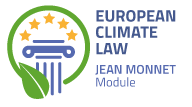Corti Varela J., Jarillo Aldeanueva A. Derecho climático europeo: políticas de la Unión y acción exterior, Tirant lo Blanc, 2024.
Climate change is a central challenge for the international community and also for the European Union. As demonstrated by the approach of this book, the so-called European Climate Law, by its very transversal nature, goes beyond strictly legal aspects and projects them towards multiple Union policies. The proposed solutions not only benefit the community club but, through international negotiations, spread, turning the European Union into a model of climate governance for other international actors. This work analyzes the enormous challenge posed by the ecological transition in all its dimensions and the effects it will have on future generations.
TABLE OF CONTENTS: Prologue (Concepción Escobar Hernández), Palabras previas: los retos de la protección internacional del medioambiente (Ismael Aznar Cano). Cap.1: La diplomacia de la Unión Europea y la acción exterior climática (Justo Corti Varela). Cap. 2: El difuso concepto de transición ecológica y su fuerza normativa (Álvaro Jarillo Aldeanueva), Cap. 3: El refugio climático en la Unión Europea: la otra migración olvidada (Susana Borràs-Pentinat), Cap. 4: Cambio climático, derechos humanos y condicionalidad de la Unión Europea (Fernando Val Garijo), Cap. 5: La condicionalidad medioambiental de la política de cooperación al desarrollo de la Unión Europea en el contexto del cambio climático (Eduardo Trillo de Martín-Pinillos), Cap. 6: Cartografía de diálogos emergentes entre justicia climática y ecológica en América Latina (María Valeria Berros), Cap. 7: Algunas declaraciones estatales en el Acuerdo de París (Nuria Pastor Palomar), Cap. 8: La Unión Europea y la gobernanza energética (María Dolores Sánchez Galera), Cap. 9: La seguridad alimentaria en la acción exterior de la Unión Europea (Miguel Ángel Martín López y Adriana Fillol Mazo), Conclusiones (Justo Corti Varela y Álvaro Jarillo Aldeanueva)
Corti Varela J., Farah, P. Science, Technology, Policy and International Law, Roudledge, 2024.
This book presents innovative insights into the intersections between science, technology, and society, and particularly their regulation by the law. Departing from the idea that law and science have similar methods and objectives, the book deals with problems, and solutions, that source from these interactions: concerns on how to integrate scientific evidence into trials, how to best regulate new technologies, or whether technological innovations could improve democratic legitimacy, create new regulatory tools or even new spaces of regulation, and what is the impact on the society. The edited collection, by building on a functionalist and comparatist approach, offers answers to how to best integrate law, science, and technology in policy-making and reviews the current attempts made at the transnational and international levels. Case studies, ranging from emerging technologies via environmental protection to statistics, are complemented by a solid theoretical framework, all of which seek to provide readers with tools for critical thinking in the reassessment of the relationship among theory, practice, political goals, and international regulation.
